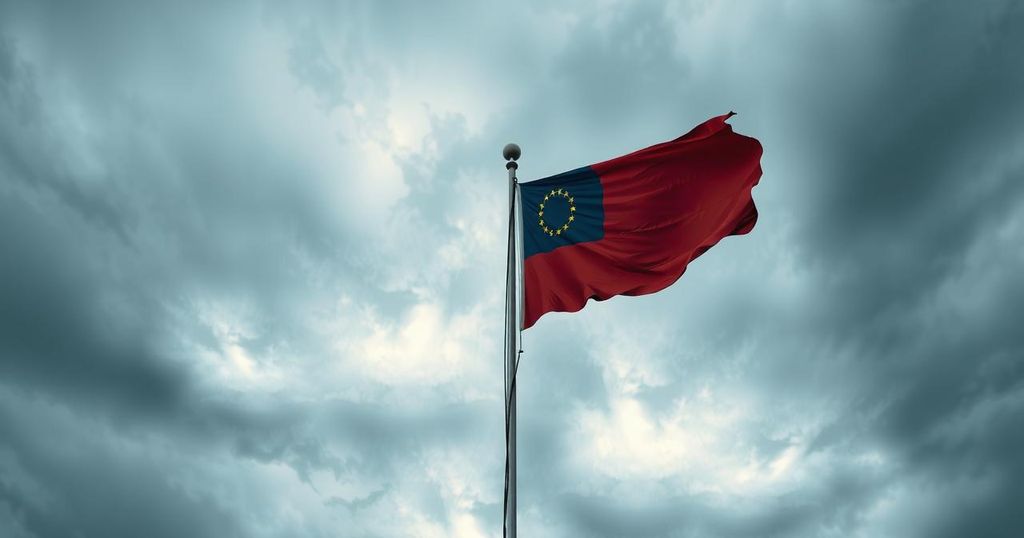The United States has expelled South Africa’s Ambassador Ebrahim Rasool amid accusations of his animus towards the U.S. and President Trump. This act, announced by Secretary of State Marco Rubio, signifies a decline in diplomatic relations, exacerbated by Rasool’s previous remarks describing Trump as a leader of a white “supremacist” movement. The response from South Africa highlights the importance of maintaining diplomatic interactions despite escalating tensions.
The United States has expelled South Africa’s Ambassador Ebrahim Rasool, citing accusations of his being a “race-baiting politician” who shows animosity towards the U.S. and President Trump. Secretary of State Marco Rubio announced this decision on March 14, 2025, indicating that Rasool is “no longer welcome in our great country.” This action represents a significant decline in U.S.-South Africa relations, which have worsened since Trump returned to office.
Rasool’s expulsion follows critical remarks made during a webinar facilitated by a South African think tank, wherein he labeled Trump as a leader of a white “supremacist” movement. This characterization angered U.S. officials, especially Rubio, who shared an article from Breitbart highlighting Rasool’s statements. Increasing tensions can be traced to Trump’s administration, known for its aggressive opposition to South Africa’s land expropriation policies intended to rectify historical racial injustices.
Trump has publicly condemned South Africa for allegedly “confiscating land” and mistreating specific demographic groups without presenting concrete evidence. Political analysts such as Patrick Gaspard, former U.S. ambassador to South Africa, view this expulsion and rising tensions as indicative of a nadir in bilateral relations since Trump’s election.
In reaction to Rasool’s expulsion, South Africa’s presidency expressed regret and underscored the significance of sustaining diplomatic ties with the U.S. Chrispin Phiri, spokesperson for the Department of International Relations and Cooperation, indicated on social media that the South African government intends to explore diplomatic avenues to resolve the issue amidst existing criticism regarding its land expropriation law and its stance on Israel at the International Court of Justice.
Rasool, an established politician and anti-apartheid advocate, previously served as the ambassador from 2010 to 2015 and resumed the role in January 2025 under Biden’s administration. Following the announcement of his expulsion, Rasool conveyed to friends and family his intentions to return to South Africa without regrets, showcasing resilience shaped by years of political activism.
Throughout the webinar, Rasool discussed Trump’s impact on Africa, positing that Trump was “mobilizing a supremacism” and pushing narratives around “white victimhood” amid demographic changes in the U.S. His comments have sparked differing interpretations, with some perceiving them as a sincere critique of U.S. politics, while others accuse him of exceeding diplomatic bounds.
Post-expulsion, South African President Cyril Ramaphosa called the decision “regrettable,” asserting that Rasool had made notable progress before the incident. Nonetheless, South African officials characterized Rasool’s actions as a breach of diplomatic norms, suggesting that it was an “isolated incident” not indicative of future relations.
Bipartisan support for Secretary Rubio’s actions has surfaced in the U.S., with Jim Risch, Chairperson of the Senate Foreign Relations Committee, endorsing Rubio’s statements as fitting. Rasool’s views and the timing of his comments highlight a broader scrutiny on diplomatic relations shaped by domestic politics in the U.S.
Rasool’s activism history adds complexity to the situation; his youth was deeply marked by apartheid, culminating in his imprisonment during protests. His connections with historical leaders like Nelson Mandela emphasize his integral role in South African political life.
As South Africa addresses the repercussions of Rasool’s expulsion, friends and fellow activists have rallied to defend him, asserting that his critiques stem from genuine concerns over socio-political issues. They argue that his targeting may relate to his advocacy for Palestinian rights and Islamic identity, indicating deeper layers within this diplomatic conflict.
The U.S.-South Africa relationship, characterized by a shared legacy of resistance against colonialism and injustice, faces uncertain prospects. Observers of international relations note that repairing trust between the two nations will necessitate delicate engagement and a commitment to addressing the fundamental tensions that have precipitated this recent diplomatic conflict.
The expulsion of South Africa’s Ambassador Ebrahim Rasool by the United States represents a critical juncture in U.S.-South Africa relations. Accusations of Rasaol being a “race-baiting politician” due to his remarks about President Trump have further strained diplomatic ties. As both countries navigate the fallout, the situation underscores the complexities inherent in international relations, notably how domestic politics can influence diplomatic discourse.
Original Source: evrimagaci.org






